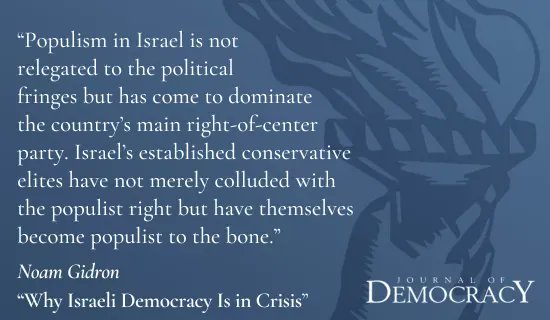 The Israeli opposition’s efforts to listen to its counterparts from illiberal Hungary and Poland, learn from their mistakes, and act strongly and swiftly, is a potential source of strength in the fight for liberal democracy, says Noam Gidron, assistant professor in the department of political science at the Hebrew University of Jerusalem.
The Israeli opposition’s efforts to listen to its counterparts from illiberal Hungary and Poland, learn from their mistakes, and act strongly and swiftly, is a potential source of strength in the fight for liberal democracy, says Noam Gidron, assistant professor in the department of political science at the Hebrew University of Jerusalem.
The story of Israel’s judicial overhaul offers several broad lessons about how we should understand, investigate, and counter democratic backsliding, he writes for the Journal of Democracy:
- Most importantly we must be willing to look beyond the usual suspects of radical, nativist political forces to find or untangle the roots of democratic decline.
- Second, we should determine whether those forces are driving or responding to mass demands.
- And finally, we should consider how the experiences of other countries are influencing both government efforts to undermine democracy and opposition efforts to counter them.
The fact that Likud, an establishment party, appears to be following the Hungarian and Polish models of using legislation to undo liberal democracy should be cause for concern among democracies everywhere, Gidron contends. RTWT
But some leaders who have gained authoritarian reputations among critics– like Recep Tayyip Erdoğan, president of Turkey, and Viktor Orbán, prime minister of Hungary – enjoy high approval ratings within their countries, notes Associate Professor at Boise State University.
Why do leaders who diminish democracy have such strong public support? Using money to give incentives to voters and invoking nationalism are two ways leaders like Erdoğan and Orbán maintain support, she writes for The Conversation. But other factors, like rising inequality, may also play a role in why people turn to strongmen leaders for answers.
Using money to give incentives to voters and invoking nationalism are two ways autocratic leaders like Erdoğan and Orbán maintain support, @BellingerNisha writes via @ConversationUS. https://t.co/LWLTaTBsm9
— Democracy Digest (@demdigest) July 13, 2023







